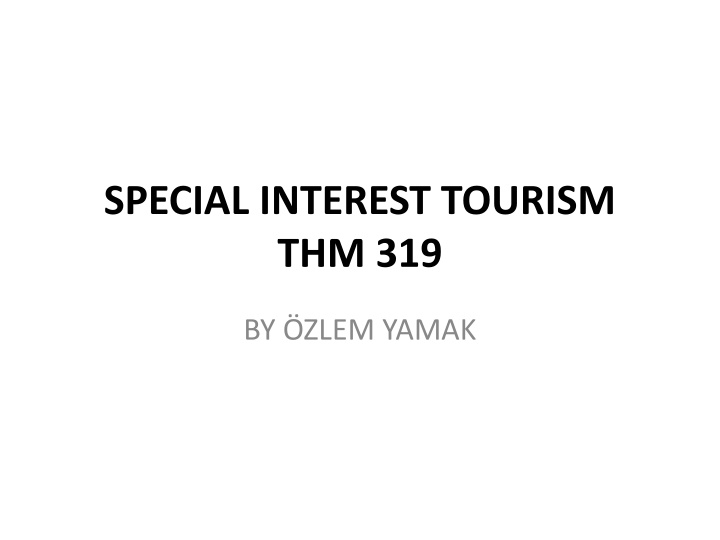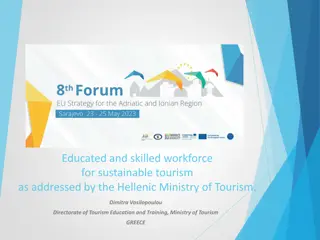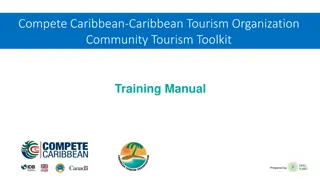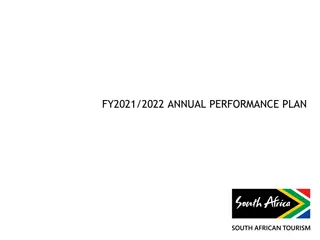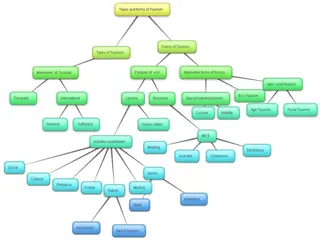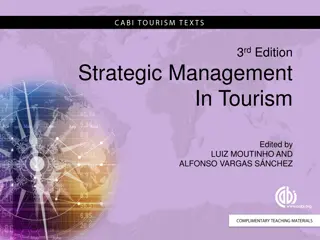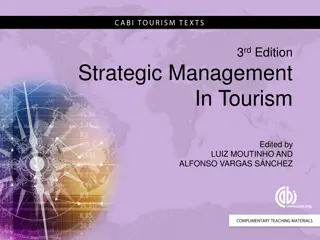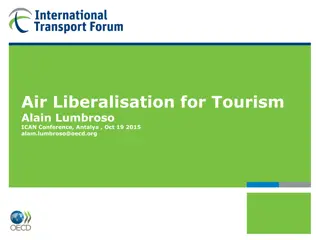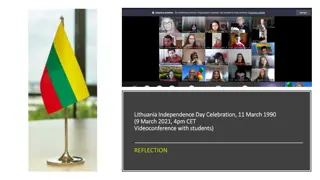World Tourism Day Celebration and Global Code of Ethics for Tourism
World Tourism Day, celebrated annually on 27th September, highlights the importance of tourism in fostering cultural understanding and promoting global unity. The event focuses on linking cultures through travel and recognizing the value of preserving diverse cultural heritage. The Global Code of Ethics for Tourism emphasizes responsible and sustainable tourism practices to protect cultural assets and minimize negative impacts on the environment. Join the effort to uphold cultural wealth for future generations.
Download Presentation

Please find below an Image/Link to download the presentation.
The content on the website is provided AS IS for your information and personal use only. It may not be sold, licensed, or shared on other websites without obtaining consent from the author.If you encounter any issues during the download, it is possible that the publisher has removed the file from their server.
You are allowed to download the files provided on this website for personal or commercial use, subject to the condition that they are used lawfully. All files are the property of their respective owners.
The content on the website is provided AS IS for your information and personal use only. It may not be sold, licensed, or shared on other websites without obtaining consent from the author.
E N D
Presentation Transcript
SPECIAL INTEREST TOURISM THM 319 BY ZLEM YAMAK
CLASS RULES NO Phones OR music Respect yourself and me Don t talk when I am talking You will lose attendance Do NOT be late ! You must sign the register in EVERY class ! Make notes It will help you on exams ASK if you don t understand.
WORLD TOURISM DAY It is celebrated annually on 27 September since 1980. Its purpose is to foster awareness among the international community of the importance of tourism and its social, cultural, political and economic value. The event seeks to address global challenges outlined in the UN Millennium Development Goals (MDGs) and to highlight the contribution the tourism sector can make in reaching these goals. World Tourism Day 2011 will be celebrated under the theme Tourism Linking Cultures, an opportunity to highlight tourism s role in bringing the cultures of the world together and promoting global understanding through travel . The message on this World Tourism Day is that, thanks to tourism, millions of people from different cultures are being brought together around the world like never before, said UNWTO Secretary-General, Taleb Rifai. This interaction between people of different backgrounds and ways of life represents an enormous opportunity to advance tolerance, respect and mutual understanding .
In 2010, 940 million tourists travelled to a different country, coming into direct contact with tangible art, monuments and intangible music, food, traditions culture. World Tourism Day 2011 is a celebration of this unique interaction and aims at furthering understanding of the values of cultural diversity. World Tourism Day 2011 will also draw attention to the importance of preserving and promoting the cultures of the world in all their forms. Culture, which compels millions of tourists to travel and spend, is of immense value in itself, but is also a vital tool for the development of a sustainable tourism sector. As such, it must be thoughtfully managed and protected, as set out in the Global Code of Ethics for Tourism which states that: Tourism policies and activities should be conducted with respect for the artistic, archaeological and cultural heritage, which they should protect and pass on to future generations . Culture is one of our most precious assets and needs protecting. As we launch World Tourism Day 2011, I call on all people to conduct tourism in a way that preserves and enriches the cultural wealth of the world for future generations, said Mr. Rifai.
The Global Code of Ethics for Tourism sets a frame of reference for the responsible and sustainable development of world tourism. It draws inspiration from many similar declarations and industry codes that have come before and it adds new thinking that reflects our changing society at the beginning of the 21st century. With international tourism forecast to reach 1.6 billion arrivals by 2020, members of the World Tourism Organization believe that the Global Code of Ethics for Tourism is needed to help minimize the negative impacts of tourism on the environment and on cultural heritage while maximizing the benefits for residents of tourism destinations. The Global Code of Ethics for Tourism is intended to be a living document. Read it. Circulate it widely. Participate in its implementation. Only with your cooperation can we safeguard the future of the tourism industry and expand the sector's contribution to economic prosperity, peace and understanding among all the nations of the world.
TOURISM ORGANISATIONS 3 Sectors within the tourism industry are: 1. Private 2. Public (Government) Organisations 3. Regulatory Bodies
TOURISM ORGANISATIONS 1. PRIVATE ORGANISATIONS Privately owned company No government/civil servants, employees Example: Tour operator, transport provider, travel agency.
TOURISM ORGANISATIONS 2. PUBLIC/GOVERNMENT ORGANISATIONS Most countries have a governmental department for tourism national, regional, local level. Government has 8 roles (Hall, 2000). Co-ordination: Sharing information, communication, with agencies (Public and Private). Planning + Controlling the development of tourism. Legislation + Regulation: Employment, immigration, visa regulations Stimulation: Increasing tourism supply with incentives (tax relief, sponsorship, marketing, promotion). Marketing + Promotion: Increasing interest in a destination and branding. Entrepreneurship: Government own or operate tourism ventures, or own and manage land. Providing social tourism: Opportunities for under-privilaged communities Protector of the Public Interest: Act as intermediary in case of conflict or competing interest.
TOURISM ORGANISATIONS 3. REGULATORY BODIES For maintaining standards within the tourism industry. There are 3: Public Reg. B. : International Civil Aviation Organisation (ICAO), The Air Transport Association (IATA), United Federation of Travel Agents Association (UFTA), United Nations (UNWTO). Supranational Reg. B : Cover a number of countries (geographical area). Bodies associated with regional trading blocks. ASEAN (Association of South-East Asia Nations), NAFTA (North American Free Trade Area), EU. National Reg. B. : Regulates and monitors travel and tourism within a nation. ABTA (Association of British Travel Agent), ATOL (Air Transport Operators Licence), CAA (Civil Aviation Authority). World Tourism Organisation
History of Travelling Wealthy people have always traveled to distant parts of the world, to see great buildings, work of arts, learn new language, experience new cultures and to taste different cusines. 1. Leisure Travel: Its started after Industrial Revolution in the United Kingdom where the first European country to promote leisure time to the increasing industrial population. Initially this applied to the owners of machinery of production, the factory owners and the traders. 2. Winter Tourism: Since that year of 1865 in St. Moritz (Swiss) many daring hotel managers choose to risk opening their hotels in winter but it was only in the seventies of the 20th centry when winter tourism took over the lead from summer tourism (Sea, sun sand) in many of the Swiss ski resorts.
History of Travelling 3. Mass Tourism: It developed with the improvements in technology, allowing the transport of large numbers of people in a short space of time to places of leisure interest, so that greater numbers of people could begin to enjoy the benefits of leisure time. 4. Adjectival or Alternative Tourism: Its refers to the numerous niche (niche is part of a wider usage of biological /ecological metaphors that informs business theory and practice) or speciality travel forms of tourism that have emerged over the years, each with its own objective. Such as eco- tourism, heritage tourism, medical tourism, space tourism, dark tourism, adventure tourism etc
Characteristics of Mass Tourism: Its emerged in 1960-70s, linked with the 3 S s Package Holiday , Thomas Cook The father of the Package Holiday Collective consumption by undifferentiated tourists. Collective gaze of tourists- focused on signifiers designed to concentrate tourists seasonally polarized consumption. Demands for familiarity by tourists. Undifferentiated product similarity of facilities and experiences. Rigidity of production highly standardized, large scale, depended on scale economies. Low prices importance of discounting and price cutting. Large numbers of tourists related to a circuit of mass production. Source: Shaw, Gareth, Allan M. Williams. Tourism and Tourism Spaces. Sage Publications Ltd. 2009.
COMPARISION OF MASS T. & ALTERNATIVE T. MASS TOUR SM General Features Rapid development Maximises Socially, environmentally inconsiderate aggressive Short term Remote control Unstable Price consciously Quantitative Growth Peak holiday periods Capacity for high seasonal demand Tourism development for everywhere Tourist Behaviour Large groups Fixed program Tourists directed Comfortable and passive ALTERNATIVE TOURISM General Features Slow development Optimises Socially, environmentally considerate cautions Long term Stable Value consciousness Qualitative Development Staggered holiday periods, no necessarily seasonal Capacity for average seasonal demand Development only in suitable places Tourist Behaviour Singles, families, small groups Spontaneous decisions Tourist decided Demanding and active
CONCEPTUALIZING SPECIAL INTEREST TOURISM (SIT) Tourists are looking for emotional stimuli, they want to buy feelings and not products. SIT emerged as a major force in the 1980s. Multiplicity of terms have emerged including: alternative , sustainable , appropriate , new , responsible , and eco tourism to capture the underpinning notions of , serious leisure and tourism. They point out that there is an underlying ambiguity in all terms, including the new term of SIT , in that tourism donotes mass participation while special interest suggest non-commercialized individual travel.
o Sustainable Tourism: The concept of sustainability has developed with the realisation that environmental resources are limited on our planet. Highlighted by the 1987 World Commission on Environment and Development s (WCED) Our Common Future (1987) and the 1992 AGENDA 21, sustainability has come to mean meeting the needs of the present generation without compromising the needs of future generation.
Three dimensions or pillars of sustainable development are now recognized an underlined. These are: Economic sustainability, which means generating prosperity at different levels of society and addressing the cost effectiveness of all economic activity. Crucially, it is about the viability of enterprises and activities and their ability to be maintained in the long term. Social sustainability, which means respecting human rights and equal opportunities for all in society. It requires an equitable distribution of benefits, with a focus on alleviating poverty. There is an emphasis on local communities, maintaining and strengthening their life support systems, recognizing and respecting different cultures and avoiding any form of exploitation. Environmental sustainability, which means conserving and managing resources, especially those that are not renewable or are precious in terms of life support. It requires action to minimize pollution of air, land and water, and to conserve biological diversity and natural heritage. It is important to appreciate that these three pillars are in many ways interdependent and can be both mutually reinforcing or in competition. Delivering sustainable development means striking a balance between them.
o Responsible Tourism is tourism that creates better places for people to live in, and better places to visit . The 2002 Cape Town Declaration on Responsible Tourism in Destinations defines Responsible minimises negative economic, environmental and social impacts generates greater economic benefits for local people and enhances the well being of improves working conditions involves local people in decisions that affect their lives and life chances makes positive contributions to the conservation of natural and cultural heritage embracing provides more enjoyable experiences for tourists through more meaningful connections with local people, and a greater understanding of local cultural, social provides access for is culturally sensitive, encourages respect between tourists and hosts, and builds local Tourism as follows: host access communities the industry and to diversity and physically environmental challenged issues people pride and confidence
Responsible tourism is fast becoming a global trend. Operators, destinations and industry organisations in South Africa, the United Kingdom, United States, the Gambia, India, Sri Lanka, are already practicing Responsible Tourism, and this list is growing. Recognising the global significance of Responsible Tourism World Travel Market, one of the world s largest travel exhibitions, has created World Responsible Tourism Day, to be celebrated annually during November. World Responsible Tourism Day is endorsed by the World Tourism Organisation and World Travel and Tourism Council. Things that Responsible Tourism is not: Responsible Tourism is not another form of niche tourism Responsible Tourism is about the legacy and the consequences of tourism for the environment, local people and local economies. Responsible Tourism does not only take place in protected natural environments Any tourism business, whether located in a thriving metropolis, a desert, rural village, sub-tropical island, medieval town can be a Responsible Tourism operation.
How Responsible Tourism differs from Sustainable Tourism Responsible tourism and sustainable tourism have an identical goal, that of sustainable development. The pillars of responsible tourism are therefore the same as those of sustainable tourism environmental integrity, social justice and maximising local economic benefit. The major difference between the two is that, in responsible tourism, individuals, organisations and businesses are asked to take responsibility for their actions and the impacts of their actions. This shift in emphasis has taken place because not much progress has been made on realising sustainable tourism since the Earth Summit in Rio. This is partly because everyone has been expecting others to behave in a sustainable way. The emphasis on responsibility in responsible tourism means that everyone involved in tourism government, product owners and operators, transport operators, community services, NGO s and CBO s, tourists, local communities, industry associations are responsible for achieving the goals of responsible tourism. GITPAC International is the first implementing agency of Responsible Tourism in four destination in kerala for Department of Tourism Government of Kerala.
The forces that are driving the growth in Responsible Tourism Planet Panic: Globally, concerns about global warming, destruction of the environment, erosion of cultures and lifestyles, and millions of people still living in poverty, are increasing. The number of initiatives aimed at saving some part of the environment, or improving the living conditions for the world s vulnerable people, increases by the day. This heightened awareness of the earth s crisis is spilling over into the way people behave in their homes, how they spend their money and the way businesses are run. Driven by changing personal ethics, individuals contribute financially or otherwise to environmental and humanitarian initiatives. They are also changing their buying patterns. There is a major upswing in responsible or ethical consumerism in the UK and in other major European markets. In the UK, the market share for ethical products grew by 22% between 1999 and 2004. Customers increasingly demand it: Increasing numbers of consumers are looking at the reputation and responsibility of the companies they buy from; they want to have guilt free holidays. This affects their direct purchases from companies in tourism destinations and it influences the choices of source market companies too. UK and other European and Australian companies and increasingly American companies are asking about the responsibility of their suppliers and introducing check lists which rate the sustainability of their practices.
Responsible tourism makes business sense: A significant, and growing, number of tourists are looking for a better experience, a better quality product. They are looking for experiences which enable them to get closer to the real living culture of countries and to experience our diverse natural and cultural heritage. This is a global trend in the established markets as consumer expectations of their holidays change, people are taking more, shorter trips, and they expect to get more from them. In commercial market research UK holidaymakers were asked whether or not they would be more likely to book a holiday with a company if they had a written code to guarantee good working conditions, protect the environment and support charities in the tourist destination. In 1999 45% said yes, when the question was asked again in 2001 52% said yes. It is a market trend that any tourism business cannot ignore. Responsible Tourism makes business sense because a growing proportion of consumers are looking for a better product. This trend implies that tourism businesses that practice Responsible Tourism will have a powerful competitive advantage over other tourism products.
SIT as the Tourism Product SUPPLY SIT was seen as a prime force in the expansion of tourism in 1980s. Product range having expanded, from that of a boutique product to a mainstream offering, special interest can be found on web pages either by checking the list of special interests/activities (e.g. Sport, wine, culture, painting, adventure, opera, battle fields ), or by geographic area (e.g. Asia, Europe ), of interest and/or affinity groups (e.g. Seniors, women, gay ), with tour operators catering for every special interest around the world. Operators have diversified their offering to attract the large market segment of the soft or novice end of spectrum, and intervening stages, either based on their own expertise within the field of special interest or their awareness of the growing latent and salient consumer demand.
SIT as the Tourism Product: SUPPLY Constant reciprocal exchange between supply and demand influences the evolvement growth and access to new leisure and tourism experiences. Technology, time squeeze, space contract, affluence and increased availability of leisure equipment and travel products have impacted on leisure and travel trends and diversified activities and destinations from the old to the new . It becomes possible to re-pacage in ways within which environment may certain the appropriate mix of new or old activities done in a new way to optimally arousing, with the individual believing that 1) She/he has enough ability to succeed at the task, 2) possessing a positive role in sustaining the quality of one s life and promote personal growth. In short, to repeat, experiences are sold on the premise of being life enhancing.
SIT DEMAND According to WTO tourism consumption patterns reflect the increasing diversity of interests of the late-modern leisure society with SIT having emerged reflecting the new values which include increased importance of outdoor activities, awareness of ecological problems, educational advances, aesthetic judgement and improvement of self and society (self-improvement and concern for society). New tourism prefixed with specific descriptors, such as ecotourism, adventure tourism, cultural tourism and SIT , serve to indicate qualitative difference from those of mass tourism, thereby promoting socially just forms of tourism , that meet tourists needs to engage in models of behaviour that, at best, again, enhance sense of self, and at worst, may be justified as being socially responsible.
SIT DEMAND The tourist in the 21st century is searching for new and exciting forms of travel in defiance of a mass-produced product yet without actually having to involve themselves in any way , a reflection of increasing commodification and depersonalization within modern and post-modern society. Commodification has changed tourism experiences in the 21st century from that of the traditional search for the totally unknown, the utmost challenging and dangerous to that of safety and comfort.
DEFINITIONS OF SIT Its difficult, but not impossible to define SIT. Hall and Weiler (1992) proposed SIT to occur when the traveler s motivation and decision-making are primarily determined by a particular special interest with a focus either on activity/ies and/or destinations and settings . Douglas et al. (2001) accordingly suggest that SIT, or alternative tourism .. has emerged from concerns for the delivery of sustainable tourism . At the same time they present a definition of SIT by Derret (2001) as the provision of customized leisure and recreational experiences driven by the specific expressed interest of individuals and groups .
It has been recognised that the term SIT comprises two major indicators: first, special interest , which suggests a need to consider the leisure context; second, tourism , pointing to the commercialization of leisure, which relates to as new tourism being large-scale packaging of non-standardized leisure services . Special Interest Tourism may be defined as a form of tourism which involves consumers whose holiday choice is inspired by specific motivations and whose level of satisfaction is determined by the experience they pursue.
SUMMARY: Reasons For Change and Growth from Mass to SIT As the tourism industry has matured an tourists become knowledgeable, have high levels of disposable income, considerable leisure time, sophisticated special types of services and products have developed to meet their travel needs. Both the leisure and business travel markets are affected by these changes and pressures. Competitive pressure of tourism market/suppliers are constantly innovating ways to differentiate themselves from other suppliers and improve their products. There is now a demand for a better quality products, which has resulted in a fragmenting of a mass market for beach vacations. People want more specialised versions, quiter resorts, family oriented holidays or niche- market targeted destination hotels. In a globalisation world as a great numbers of people travel, the tourists look for different travel experiences, new tourism products become profitable.
